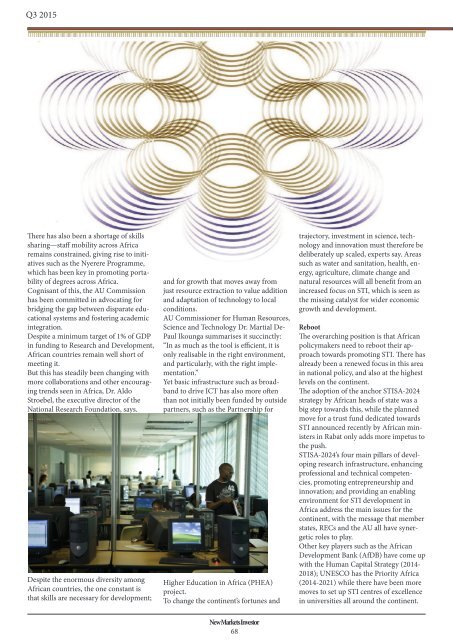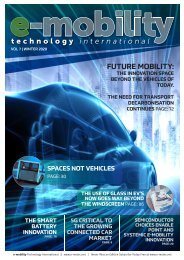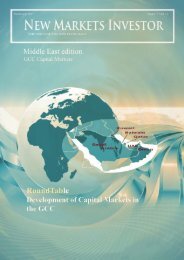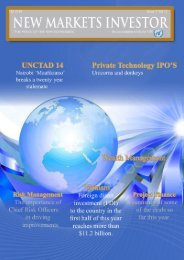Q3 2015There has also been a shortage of skillssharing—staff mobility across Africaremains constrained, giving rise to initiativessuch as the Nyerere Programme,which has been key in promoting portabilityof degrees across Africa.Cognisant of this, the AU Commissionhas been committed in advocating forbridging the gap between disparate educationalsystems and fostering academicintegration.Despite a minimum target of 1% of GDPin funding to Research and Development,African countries remain well short ofmeeting it.But this has steadily been changing withmore collaborations and other encouragingtrends seen in Africa, Dr. AldoStroebel, the executive director of theNational Research Foundation, says.Despite the enormous diversity amongAfrican countries, the one constant isthat skills are necessary for development;and for growth that moves away fromjust resource extraction to value additionand adaptation of technology to localconditions.AU Commissioner for Human Resources,Science and Technology Dr. Martial De-Paul Ikounga summarises it succinctly:“In as much as the tool is efficient, it isonly realisable in the right environment,and particularly, with the right implementation.”Yet basic infrastructure such as broadbandto drive ICT has also more oftenthan not initially been funded by outsidepartners, such as the Partnership forHigher Education in Africa (PHEA)project.To change the continent’s fortunes andtrajectory, investment in science, technologyand innovation must therefore bedeliberately up scaled, experts say. Areassuch as water and sanitation, health, energy,agriculture, climate change andnatural resources will all benefit from anincreased focus on STI, which is seen asthe missing catalyst for wider economicgrowth and development.RebootThe overarching position is that Africanpolicymakers need to reboot their approachtowards promoting STI. There hasalready been a renewed focus in this areain national policy, and also at the highestlevels on the continent.The adoption of the anchor STISA-2024strategy by African heads of state was abig step towards this, while the plannedmove for a trust fund dedicated towardsSTI announced recently by African ministersin Rabat only adds more impetus tothe push.STISA-2024’s four main pillars of developingresearch infrastructure, enhancingprofessional and technical competencies,promoting entrepreneurship andinnovation; and providing an enablingenvironment for STI development inAfrica address the main issues for thecontinent, with the message that memberstates, RECs and the AU all have synergeticroles to play.Other key players such as the AfricanDevelopment Bank (AfDB) have come upwith the Human Capital Strategy (2014-2018); UNESCO has the Priority Africa(2014-2021) while there have been moremoves to set up STI centres of excellencein universities all around the continent.<strong>New</strong> <strong>Markets</strong> <strong>Investor</strong>68
Q3 2015ManagementEducation witha Practical EdgeIn 1991, Lagos Business School started asa small institution offering managementcourses relevant to the Nigerian environmentin a suburb of the Lagos metropolis.Ever since, the School has madedynamism its hallmark, leveraging on itsrobust knowledge of business in Africaand beyond to offer managers the bestin business education. Today, LBS is reputedto be one of the foremost businessschools in Africa, and has sustained theFinancial Times’ coveted ranking of topopen enrolment programme providersfor the eighth time in a row.Dr Enase Okonedo, Dean of the Institution,has continually emphasised thatthe hallmark of a good business schoolis striving for more qualitative offerings.This, she explains, would involve goingbeyond just having an undergraduate andmaster’s programme in business administration,but also offering courses comparableto what obtains globally.Service OfferingsLBS adopts the case-study method tofacilitate learning, enabling students toapply the concepts and skills that coursesare designed to teach, and integrateknowledge from other courses and evenlife experiences.The School engages the services ofworld-renowned local and internationalfaculties to facilitate its MBA andExecutive Education programmes. Inthe course of both programmes, participantsare equipped with the right ethicalattitude in management and business,and values that will stand them in goodstead in the real world such as integrity,professionalism, spirit of service, mutualrespect and community.LBS’ full-time MBA programme is designedto prepare managers to succeed inthe increasingly complex global businessenvironment. Effective September thisyear, the programme will run for 18months as against 21, and applicants willbe required to have a minimum of threeyears’ post-qualification work experienceas against one. They will also haveopportunities to embark on internationalexchange programmes for elective coursesupon successful admission.The programme’s part-time variant, theExecutive MBA (EMBA), is especiallysuited for managers who hold positionsof responsibility in companies wherethey have good career prospects. Theprogramme runs for 24 calendar months.The last variant, the Modular ExecutiveMBA programme (MEMBA), is designedfor busy professionals looking for qualitymanagement education that combinesflexibility with a strong academic background.“While LBS is not the only business managementeducation institution in Nigeria,we are proud of our programmes,” saysMBA Director Dr. Uchenna Uzo. “LBSattracts the best and the brightest facultymembers who impart knowledge andconduct research to ensure the institutionis at the cutting edge of managementeducation and business practice. LBS alsopartners with other international institutionssuch as IESE Business School, tobroaden participants’ exposure to facultyand students around the world.”Making a DifferenceIn recent times, several of the School’sMBA students have proved their mettle,making a difference far and wide withthe quality of business education theyhave received. Last year, Onyanta Adama(MBA 13) made the shortlist for the FTMBA Challenge with UK charity WorldChild Cancer. She joined five otherstudents from Lagos and abroad to drafta plan on how Ghana could treat childhoodcancer in a self-sustainable manner.In the same year, a group of MBA studentsparticipated in the African BusinessPracticum organised by the Yale Schoolof Management and came tops, settingthe stage for their participation in the InternationalLeadership Case Competition(ILCC) 2015 held in the same institutionrecently, where they got accolades forbeing the only participants from Africa,as well as the rare skills in business caseanalysis they displayed.“It was an opportunity to positionourselves as competent MBA studentsfrom Africa, knowing we have the skillsto compete with top business schoolsglobally so they realise that Africa canproduce people with analytical skills,”said Babalola Williams (MBA 13), one ofthe participants.Executive EducationExecutive Education at LBS is no lesscomprehensive, drawing on the experiencesof multinational faculties andparticipants. The curriculum ensures thatparticipants gain management knowledgeand skills through the case-studymethod and group-work approach tolearning. The list of programmes in thisclass includes the Advanced ManagementProgramme (AMP), Chief Executive<strong>New</strong> <strong>Markets</strong> <strong>Investor</strong>69
- Page 1 and 2:
Q3 2015Q3 2015Issue 3 Vol.10New Mar
- Page 3 and 4:
Q3 2015
- Page 5 and 6:
Q3 2015Energy20 Renewable energyAfr
- Page 7 and 8:
New Markets Investor7Q3 2015
- Page 9 and 10:
New Markets Investor9Q3 2015
- Page 11 and 12:
New Markets Investor11Q3 2015
- Page 13 and 14:
New Markets Investor13Q3 2015
- Page 15 and 16:
Q3 2015: “Once we have the infras
- Page 17 and 18: New Markets Investor17Q3 2015
- Page 19 and 20: Q3 2015investment projects, or a pr
- Page 21 and 22: Q3 2015provide a semblance of inves
- Page 23 and 24: New Markets Investor23Q3 2015
- Page 25 and 26: Q3 2015SEACO M is not, however, res
- Page 27 and 28: Q3 2015WEF Africa 2015Africa Compet
- Page 29 and 30: New Markets Investor29Q3 2015
- Page 31 and 32: Q3 2015Bumbuna Hydroelectric Projec
- Page 33 and 34: New Markets Investor33Q3 2015
- Page 35 and 36: Q3 2015nations, South Africa may be
- Page 37 and 38: Q3 2015The development of Africanma
- Page 39 and 40: Q3 2015FoodCurrently, food dominate
- Page 41 and 42: Q3 2015a regular basis. Ghanaian Gr
- Page 43 and 44: Q3 2015NigeriaFoodThe Nigerian reta
- Page 45 and 46: New Markets Investor45Q3 2015
- Page 47 and 48: New Markets Investor47Q3 2015
- Page 49 and 50: New Markets Investor49Q3 2015
- Page 51 and 52: Q3 2015and are prepared to work in
- Page 53 and 54: New Markets Investor53Q3 2015
- Page 55 and 56: Q3 2015Africa’s largest, most vib
- Page 57 and 58: Q3 2015Côte d’IvoireIvory Coast
- Page 59 and 60: Q3 2015NigeriaFrom a political risk
- Page 61 and 62: Q3 2015SunPower designedand is cons
- Page 63 and 64: Q3 2015indirectly, become voluntary
- Page 65 and 66: New Markets Investor65Q3 2015
- Page 67: Q3 2015the result being to clear th
- Page 71 and 72: New Markets Investor71Q3 2015
- Page 73 and 74: Q3 2015A smart, inter-connected urb
- Page 75 and 76: Q3 2015Naivasha, KenyaCasablanca, M
- Page 77 and 78: New Markets Investor77Q3 2015
- Page 79 and 80: Q3 20152014. This sets Nigeria’s
- Page 81 and 82: Q3 2015The Lilygate Lekki reception
- Page 83 and 84: Q3 2015in 2008. The industry produc
- Page 85 and 86: New Markets Investor85Q3 2015
- Page 87 and 88: Q3 2015Adesina promisedto work hard
- Page 89: Q3 2015Sectors in vogue with foreig
- Page 92 and 93: Q3 2015New Markets Investor92
- Page 94 and 95: Q3 2015equity investment. She estim
- Page 96: Q3 2015New Markets Investor96









